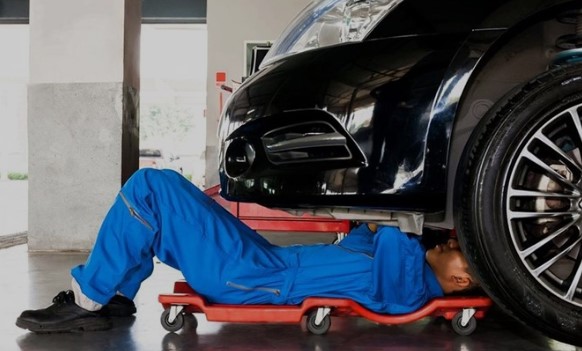Owning a car comes with its fair share of joys and responsibilities. While the freedom of the open road is exhilarating, the prospect of car repairs can be daunting. Whether it’s a routine maintenance task or an unexpected breakdown, understanding the basics of car repairs is essential for every vehicle owner. In this comprehensive guide, we’ll explore the world of car repairs, from preventive maintenance to troubleshooting common issues.
The Importance of Regular Maintenance
Preventive maintenance is the cornerstone of keeping your car in top-notch condition. Regular check-ups and servicing not only extend the life of your vehicle but also prevent potential issues from escalating into costly repairs. Here are some key aspects of preventive maintenance:
Oil Changes:
Regular oil changes are crucial for the health of your engine. Engine oil lubricates moving parts, reduces friction, and helps dissipate heat. Over time, oil breaks down and loses its effectiveness. Failing to change it regularly can lead to engine damage and decreased fuel efficiency.
Tire Care:
Proper tire maintenance is essential for safety and performance. Check tire pressure regularly, rotate tires as recommended, and replace them when the tread wears down. Well-maintained tires contribute to better fuel efficiency and a smoother ride.
Brake System Inspection:
Your car’s brakes are a critical safety component. Regularly inspect brake pads, rotors, and fluid levels. Squeaky or grinding noises, unusual vibrations, or a soft brake pedal may indicate issues that need immediate attention.
Common Car Repairs
Despite meticulous maintenance, cars can encounter issues that require repair. Understanding these common problems can help you address them promptly:
Battery Issues:
A dead or weak battery is a frequent cause of vehicle breakdowns. Check battery terminals for corrosion, ensure proper connections, and replace old batteries as needed. Additionally, have your charging system inspected regularly to prevent unexpected failures.
Alternator and Starter Problems:
The alternator and starter work in tandem to power your vehicle. Signs of trouble include difficulty starting the engine, dimming headlights, or a warning light on the dashboard. Addressing these issues early can prevent a costly breakdown.
Suspension System Repairs:
A worn-out suspension can result in a bumpy ride and poor handling. If you notice unusual noises, uneven tire wear, or a drifting sensation while driving, have your suspension system inspected. Repairs may involve replacing shocks, struts, or other components.
Exhaust System Maintenance:
The exhaust system plays a crucial role in vehicle performance and emissions control. Rust, leaks, or a loud muffler can indicate problems. Regular inspections and prompt repairs are essential to ensure your car meets emission standards and operates efficiently.
Transmission Troubles:
Transmission issues can be complex and costly. Signs of trouble include slipping gears, delayed or rough shifting, or unusual noises. Regularly servicing your transmission fluid and addressing issues promptly can prevent major repairs.
DIY vs. Professional Repairs
While some car maintenance tasks can be tackled by the average vehicle owner, there are limits to what a DIY approach can achieve. Here’s a breakdown of when to roll up your sleeves and when to seek professional help:
DIY Maintenance:
Simple tasks like changing the oil, replacing air filters, and rotating tires are within reach for many car owners. Consult your vehicle’s manual for specific instructions and safety guidelines. DIY maintenance not only saves money but also fosters a deeper understanding of your car’s inner workings.
Professional Repairs:
Complex issues, such as electrical problems, transmission repairs, or major engine overhauls, are best left to professional mechanics. Modern vehicles are equipped with advanced technology, and attempting intricate repairs without the necessary expertise can lead to further damage. Additionally, some repairs may require specialized tools and equipment only available at professional auto repair shops.
Choosing a Reliable Auto Repair Shop
When it comes to entrusting your car to a repair shop, finding a reliable and trustworthy service provider is crucial. Here are some tips for selecting the right auto repair shop:
Read Reviews:
Online reviews and testimonials from other customers can provide valuable insights into a repair shop’s reputation. Look for feedback on their professionalism, quality of service, and transparency in pricing.
Certifications and Credentials:
Choose a repair shop with certified technicians and memberships in industry associations. ASE (Automotive Service Excellence) certification is a good indicator of a technician’s competence.
Ask for Recommendations:
Seek recommendations from friends, family, or colleagues who have had positive experiences with auto repair shops. Personal referrals often provide a reliable gauge of a shop’s reliability and customer service.
Get Multiple Quotes:
Don’t hesitate to obtain quotes from several repair shops for the same service. This can help you gauge the average cost of the repair and identify any outliers. Be wary of significantly low quotes, as they may indicate subpar service or the use of inferior parts.
Conclusion
Car repairs are an inevitable aspect of vehicle ownership, but with the right knowledge and approach, they can be managed effectively. Regular maintenance, prompt attention to warning signs, and a proactive mindset are key to keeping your car running smoothly. Whether you’re a DIY enthusiast or prefer leaving the repairs to professionals, understanding the basics empowers you to make informed decisions about your vehicle’s care. By taking a proactive stance, you can navigate the maze of car repairs with confidence, ensuring a reliable and enjoyable driving experience for years to come.
